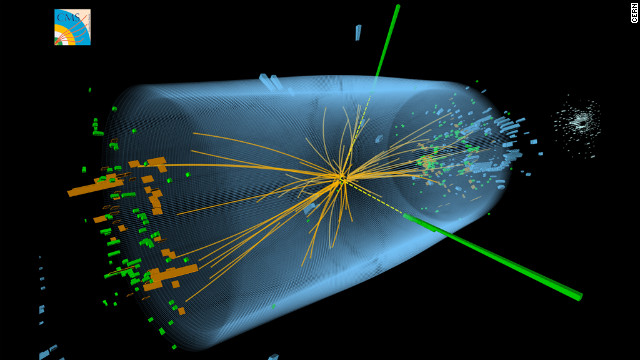 |
| A proton-proton collision produced in the Large Hadron Collider shows characteristics in line with the decay of a Higgs boson particle. |
The universe is filled with Higgs bosons. As atoms and parts of atoms zoom around, they interact with and attract Higgs bosons, which cluster around them in varying numbers. Certain particles will attract larger clusters of Higgs bosons, and the more of them a particle attracts, the greater its mass will be.The explanation helped complete scientists' understanding of the nature of all matter. "The awarded theory is a central part of the Standard Model of particle physics that describes how the world is constructed," the Royal Swedish Academy said in a post on Twitter.
As is tradition, the academy phoned the scientists during the announcement to inform them of their win. They were unable to reach Higgs, for whom the particle is named. The conversation with Englert was short and sweet. "I feel very well, of course," he said, when he heard the news. "Now, I'm very happy."
What is the Higgs boson and why is it important?
The July 2012 discovery of the Higgs boson in the most powerful particle accelerator in the world, the Large Hadron Collider at CERN, has been billed as one of the biggest scientific achievements of the past 50 years.
But the Royal Academy passed over the Higgs boson last year, to the surprise of many.
The scientists, in the meantime, have confirmed their discovery and solidified its place in science.
On March 14, what would have been Albert Einstein's birthday, they announced that, over time, the particle they found looked even more like the Higgs boson they had been chasing for almost 50 years. It was a landmark scientific advancement, and it was a first. Many scientists dislike the term "God particle," even though it's become popular in the media. The nickname came from the title of a book by Leon Lederman, who reportedly wanted to call it the "Goddamn Particle" since it was so hard to find.
The Nobel Prize in physics makes a nice lifetime achievement award for Englert and Higgs. Both are professors emeritus: Englert at the Free University of Brussels; Higgs at the University of Edinburgh in Scotland. Though deserving, they are lucky, as the Royal Academy had a long list of brilliant scientists and achievements to choose from. And the field of physics covers a virtually infinite scale, from beyond the smallest sub-atomic particles to the largest, most distant stars and quasars in the vast reaches of the universe. CNN
No comments:
Post a Comment